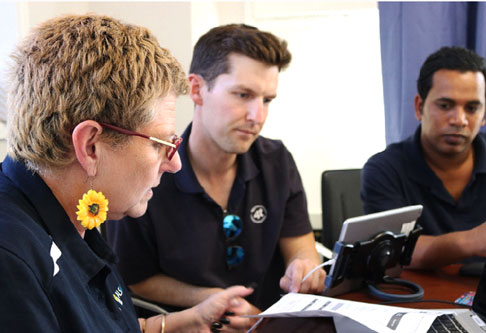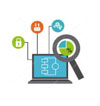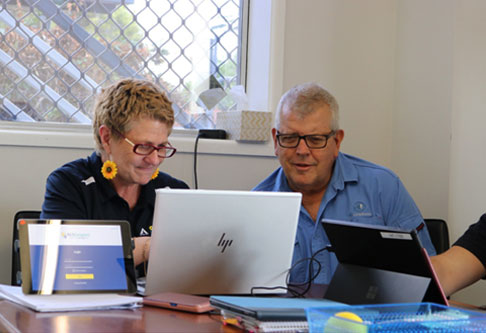ONE OF OUR CONSTANT CHALLENGES …
TAMING THE HUGE AMOUNTS OF DATA WE COLLECT.

Electronic data capture and management for environmental monitoring
The search for full automation continues…
One of our constant challenges is taming the huge amounts of data we collect on behalf of our clients.

For years, we have been experimenting with ways to make data collection and management – from field monitoring through to reporting – faster and more accurate.
Way back in the technological dark ages (the early 2000’s) we trialled using Palm Pilots for field data collection. Some of you reading this blog probably won’t even be old enough to remember the Palm Pilot!
Anyway, the trial didn’t succeed. The technology just wasn’t as advanced as our hopes for it. I think we finished up selling a box full of them at a garage sale for $10 each.

Over the ensuing years, we have continually tried other solutions and technologies. At long last, we’re getting there. Technology available today is making our dreams of electronic data capture, management, interpretation and reporting a reality. One of the big steps for us in this process has been working with the laboratory company ALS.
ALS is a company headquartered in Brisbane, Australia, that services over 350 environmental clients across 65 countries. In 2019, ALS rolled out their digital platform – the Compass Sampling Assistant app. Using Compass starts at the quote stage for a particular project.
A quote for the project, noting all the sites and analytes is loaded into Compass, and the data process cascades out from that quote.

4T Consultants were amongst the first testers of Compass. All our field staff have been trained on using Compass. Our long-time ALS contact and friend Jenny Bevan flew up to Emerald for a hands-on session, to make sure everyone was trained correctly. We currently use the programme with almost all of our client projects that have regular scheduled monitoring.
How we use ALS Compass:
- We have created a master Chain of Custody for each project, with every sampling site added to it.
- The analysis parameters for each site are checked at the quote stage.
- Once the quote is loaded into Compass, the master COC is built using the quote and its associated tables for the project.
- We then create the Chain of Custody from the Master, and non-required sites are deleted.
- Barcoded sample bottles are then scanned into the app and sent to the lab.
- A GPS locator within the app notes the sampling location. Photos of the sampling site can also be attached.

How ALS has helped us:
- Time Saving: Dispatching bottles can be time consuming – cross checking dates and times with COC’s. ALS has removed this step, making the dispatch process much quicker.
- Removal of errors: Compass reduces the chance of errors as data is automatically transferred from Compass to the COC and then further to the Certificate of Analysis.
- Ease of use: ALS Compass has made collecting the correct bottles much easier. The app allows the field team to view the analytes and quotes. It tells the team what bottles to collect and how much volume is needed, and the site will only show up as completed once each bottle has been scanned.
- Accessibility: Compass allows samples to be scanned and dispatched by any member of the team, whether in the field or back at the 4T base.
- ALS Compass helps to improve efficiency in the field, improve quality through eliminating data transcription, and ultimately improves project delivery.
ALS Compass is a big hit with the 4T team. Not only does it make the job easier saving us time and money it removes human error making our data 100% accurate when we report back to our clients.
Our sights are now set on the next stages of our data management and visualisation journey.
Bronwyn Reid | 4t Consultants
1 July, 2020
